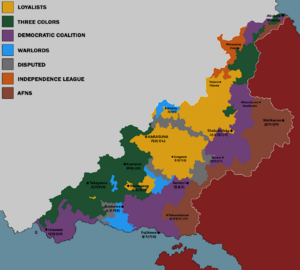Enyaman Civil War
This article is incomplete because it is pending further input from participants, or it is a work-in-progress by one author. Please comment on this article's talk page to share your input, comments and questions. Note: To contribute to this article, you may need to seek help from the author(s) of this page. |
| Enyaman Civil War | |||||||||
|---|---|---|---|---|---|---|---|---|---|
 Military Situation in February 2020 | |||||||||
| |||||||||
| Belligerents | |||||||||
|
(Aug. 2019 - Oct. 2019) |
(See below) | ||||||||
| Military support: Logistical support: |
|
Logistical support: |
Other warlords: | ||||||
The Enyaman Civil War (Enyaman Tsurushemese: 에냐마 나이센, Enyama naisen, Enyaman Latin: Bellum Civile Aniamus), also called the Great Northern Chaos or the Interstate War is an ongoing multi-sided civil war in the Norumbrian nation of Enyama fought between the totalist Enyaman National State led by former Enyaman President Muratagi Eijiro, and various domestic and foreign forces opposing both the former Enyaman government and each other in varying combinations, including the democratic-socialist Enyaman Democratic Coalition, the stratocratic Three Colors army which consists of the former Enyaman Armed Forces sans the Internal Troops, and the Independence League which aims for Enyaman balkanization. The conflict was spurred by an invasion from Skaldafen and the ensuing chaos; the Skaldanian military is still involved in the conflict, as are military forces from Belfras, Jhengtsang, and others. Nations indirectly involved in the conflict include Ghant, Yisrael, Latium, Thraysia, Mutul, Tsurushima, Valtgea, and Lion's Rock.
Background
Enyama is a diverse nation situated in northern Norumbria, slowly molded over history from interaction between several waves of settlers and their mingling with the natives. Enyama's majority ethnicity is that of the Enyaman Tsurushemese, largely directly descended from the Tsurushiman settlers which arrived on the nation's southwestern shore in the 13th century, mixed with the remnants of the Olkota culture which the wave of settlers eradicated. In addition to its Tsurushiman majority, Enyama has a substantial minority of Latin and Skaldanians that predate Tsurushiman concentration, centered around the northeastern tip of the nation. Having run Norumbria's only merchant republic in the past, the Skaldano-Latin bloc has either been historically ignored or oppressed by the nations' Tsurushimese majority.
Enyama's historically libertarian and anti-authoritarian culture, which had been reactionary to Tsurushemese colonial governance, was tested in 1989 by a failed Syndicalist coup, and again through the following two decades as organized crime, headed by the Yakuza-esque Gokudo crime organizations, more or less assumed control of the nations' local governance and instituted systemic political and civic corruption.
Muratagi Eijiro and New Frontier government
In 2005, populist frontrunner Muratagi Eijiro won the presidential election on a strong anti-crime and economic revitalization platform. His newly-formed big tent right-wing populist party, the New Frontier Party, also gained a substantial majority in the Asenbura, giving Muratagi little political resistance in the way of enacting his reforms. At the time of his initial election, Muratagi focused largely on crime and avoided describing ethnic or broader economic problems. In December of 2005, while Muratagi was still President-Elect, the Shinobi-Kai of the Enyaman Ground Forces killed Enyama's most powerful crime lord, Hoki Hisato, brutally burning down his mansion and strafing it with an attack helicopter. The Hoki incident set the stage for Muratagi's hard stance on his opposition.
By 2007, the New Frontier administration had begun a substantial rearmament of the neglected Enyaman military, beginning slowly to fortify the border and posture against Enyama's southern neighbor, the Skaldafen Confederation. Though the two nations had previously enjoyed lukewarm or even cordial relations, the New Frontier's populist initiatives began to establish a system of intense racial and cultural propaganda which favored the Tsurushemese majority over any of the nations' minorities. Subsequently, Muratagi created the Internal Troops of Enyama, which served as a paramilitary wing that many were encouraged to join. The Metsuke, a secret police, was also formed, and began in 2008 to coerce academia into rewriting Enyaman prehistory to better favor Tsurushemese accomplishments. International democrats were worried about Enyama's descent into populism; in 2011, amid sweeping military budget increases and reorganization, the Forum of Nations reclassified Enyama as an illiberal democracy. Muratagi spurred economic growth in previously undeveloped regions by initiating the construction of two nuclear power plants, fostering a domestic arms industry, and improving Enyama's spotty infrastructure, thus gaining him more popular support among his base.
For the Latin, Oklota, and especially Skaldanian minorities, however, Muratagi's regime typically brought a slew of human rights abuses. Gokudo enforcers, as well as Metsuke and Internal Troops, began to more strictly police Hakutochi state, where non-Tsurushemese groups are the majority, and in 2016, amid another election victory, Enyama opened its first concentration camp for political dissidents and religiously devout Paleocists, which typially included Skaldanians. In 2018, amid increasing resistance from the Skaldanian minority thought to be supported by Skaldafen intelligence, Muratagi declared martial law within Hakutochi state, thus completing the area's militarization.